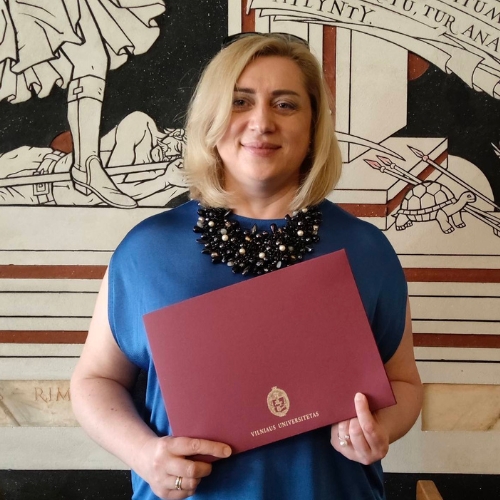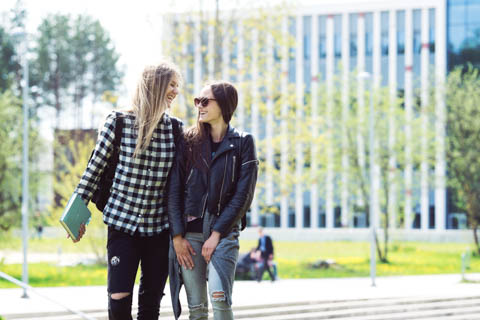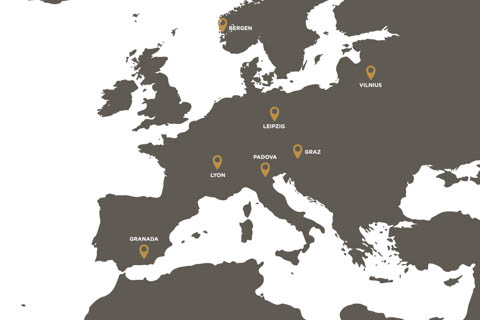|
Semester 1 Autumn |
| Compulsory Courses |
20.0 |
| East and West in Russian Culture |
5.0 |
| General and Typological Linguistics |
10.0 |
| Methodology of Literary Theory |
5.0 |
| Optional Courses |
10.0 |
| variant LINGUISTICS (you can choose subjects from any variant, regardless of your study program) |
10.0 |
| Applied Linguistics (and a research project) |
10.0 |
| Baltic Onomastics |
5.0 |
| Contrastive Grammar |
5.0 |
| Contrastive Grammar |
5.0 |
| Contrastive Grammar of the Baltic Languages |
5.0 |
| Critical Discourse Analysis |
5.0 |
| Current Approaches to Language Testing and Assessment |
5.0 |
| Digital Resources of the Baltic Languages |
5.0 |
| Effective Scientific Discourse |
5.0 |
| Etymology |
5.0 |
| Grammar Theory |
5.0 |
| Issues in Lexical Typology |
5.0 |
| Language and Culture |
5.0 |
| Language and Gender: From Grammar to Politics |
5.0 |
| Legal Argumentation |
5.0 |
| Linguistic Pragmatics |
5.0 |
| Linguistic Typology |
10.0 |
| Linguistic Typology (and a research project) |
10.0 |
| Media Linguistics I/III p. |
5.0 |
| Media Linguistics I/III p. |
5.0 |
| Media Linguistics III/III p. |
10.0 |
| Media Linguistics (Medialisation of Political Discourse) III/III p. |
10.0 |
| Prussian Studies |
5.0 |
| Research on Old Lithuanian and Latvian Texts |
5.0 |
| Sociolinguistics |
10.0 |
| Terminology |
5.0 |
| Trends in Contemporary Linguistics (and a research project) |
10.0 |
| variant LITERATURE AND CULTURE (you can choose subjects from any variant, regardless of your study program) |
10.0 |
| Ancient Metamorphoses in Modern Literature |
5.0 |
| Authorship and 'the Author Question' in Literary Discourse |
5.0 |
| Cultural Representations of Gender and Family |
5.0 |
| Cultural Studies |
5.0 |
| Editing Culture Texts |
5.0 |
| Experiential Learning and Applied Project |
5.0 |
| Experiential Learning and Research Project in Gender Studies |
5.0 |
| Hermeneutical Theory of Culture |
5.0 |
| Intertextuality: theory and practice |
5.0 |
| Islam and Christian Culture |
5.0 |
| James Joyce |
5.0 |
| Language and Thinking |
5.0 |
| Linguocultural Studies |
5.0 |
| Literature and the Anthropocene |
10.0 |
| Lithuanian Literature and Cultures of Memory |
5.0 |
| Methods in Literary Studies |
5.0 |
| Narratives of place and migration in the NBS region |
5.0 |
| Phenomenology I: The Basics of Phenomenology |
5.0 |
| Postcolonial Studies and Literature |
5.0 |
| Psychoanalytical Criticism of Art |
5.0 |
| The Arts of the Muses in Antiquity |
5.0 |
| The Great Shift? The Revival of Classical Antiquity in Italian Literature |
5.0 |
| The Victorian Novel and its Contemporary Transformations |
5.0 |
| Theme of Madness in Literature |
5.0 |
| variant TRANSLATION (you can choose subjects from any variant, regardless of your study program) |
10.0 |
| Computer-Aided Translation |
5.0 |
| Practical Rhetoric |
5.0 |
| Translation of Literary Texts II/II p. |
5.0 |
| Translation of Lithuanian Literature into English |
5.0 |
|
Semester 2 Spring |
| Compulsory Courses |
20.0 |
| Development of Culture in the Grand Duchy of Lithuania |
5.0 |
| New Linguistic Schools |
10.0 |
| The Canon of Russian Novel |
5.0 |
| Optional Courses |
10.0 |
| Contrastive Grammar of Slavic Languages |
5.0 |
| Media Linguistics II/III p. |
5.0 |
| Sociology of Russian Literature |
5.0 |
| Typology of the Media Genres |
5.0 |
|
Semester 3 Autumn |
| Compulsory Courses |
20.0 |
| Academic Writing |
5.0 |
| Current Issues in Modern Russian Literature |
10.0 |
| Semantics and Pragmatics |
5.0 |
| Optional Courses |
10.0 |
| variant LINGUISTICS (you can choose subjects from any variant, regardless of your study program) |
10.0 |
| Applied Linguistics (and a research project) |
10.0 |
| Baltic Onomastics |
5.0 |
| Contrastive Grammar |
5.0 |
| Contrastive Grammar |
5.0 |
| Contrastive Grammar of Lithuanian and Italian |
5.0 |
| Contrastive Grammar of the Baltic Languages |
5.0 |
| Critical Discourse Analysis |
5.0 |
| Current Approaches to Language Testing and Assessment |
5.0 |
| Digital Resources of the Baltic Languages |
5.0 |
| Effective Scientific Discourse |
5.0 |
| Etymology |
5.0 |
| Grammar Theory |
5.0 |
| Issues in Lexical Typology |
5.0 |
| Language and Culture |
5.0 |
| Language and Gender: From Grammar to Politics |
5.0 |
| Legal Argumentation |
5.0 |
| Linguistic Pragmatics |
5.0 |
| Linguistic Typology |
10.0 |
| Linguistic Typology (and a research project) |
10.0 |
| Media Linguistics I/III p. |
5.0 |
| Media Linguistics III/III p. |
10.0 |
| Media Linguistics (Medialisation of Political Discourse) III/III p. |
10.0 |
| Prussian Studies |
5.0 |
| Research on Old Lithuanian and Latvian Texts |
5.0 |
| Sociolinguistics |
10.0 |
| Terminology |
5.0 |
| Trends in Contemporary Linguistics (and a research project) |
10.0 |
| variant LITERATURE AND CULTURE (you can choose subjects from any variant, regardless of your study program) |
10.0 |
| Ancient Metamorphoses in Modern Literature |
5.0 |
| Authorship and 'the Author Question' in Literary Discourse |
5.0 |
| Cultural Representations of Gender and Family |
5.0 |
| Cultural Studies |
5.0 |
| Editing Culture Texts |
5.0 |
| Experiential Learning and Applied Project |
5.0 |
| Experiential Learning and Research Project in Gender Studies |
5.0 |
| Hermeneutical Theory of Culture |
5.0 |
| Intertextuality: theory and practice |
5.0 |
| Islam and Christian Culture |
5.0 |
| James Joyce |
5.0 |
| Language and Thinking |
5.0 |
| Linguocultural Studies |
5.0 |
| Literature and the Anthropocene |
10.0 |
| Lithuanian Literature and Cultures of Memory |
5.0 |
| Methods in Literary Studies |
5.0 |
| Narratives of place and migration in the NBS region |
5.0 |
| Phenomenology I: The Basics of Phenomenology |
5.0 |
| Postcolonial Studies and Literature |
5.0 |
| Psychoanalytical Criticism of Art |
5.0 |
| The Arts of the Muses in Antiquity |
5.0 |
| The Great Shift? The Revival of Classical Antiquity in Italian Literature |
5.0 |
| The Victorian Novel and its Contemporary Transformations |
5.0 |
| Theme of Madness in Literature |
5.0 |
| variant TRANSLATION (you can choose subjects from any variant, regardless of your study program) |
10.0 |
| Computer-Aided Translation |
5.0 |
| Practical Rhetoric |
5.0 |
| Translation of Literary Texts II/II p. |
5.0 |
| Translation of Lithuanian Literature into English |
5.0 |
|
Semester 4 Spring |
| Compulsory Courses |
30.0 |
| Master Final Thesis (Study field: Philology by language) |
30.0 |
 „The Vilnius University program “Russian Studies: Literature, Linguistics, Culture” offers a meticulously balanced curriculum covering various areas: linguistics, art canon, 19th-21st century literature, and the influence of history on cultural development. Students can choose from a broad range of courses, including the linguistic history of the Grand Duchy of Lithuania, media linguistics, and more. It is worth highlighting the excellent interaction with the teaching staff, which facilitates quick resolution of challenges and creates a conducive learning environment. Motivated students are given every opportunity for deep immersion in the subject matter, with lectures that include discussions and various options for creative expression, professional, and personal growth. Vilnius University offers excellent opportunities for those seeking comprehensive education, combining academic excellence with personalized support and attention to each student. My firsthand experience confirms all of the above, and I wholeheartedly recommend this program.“
„The Vilnius University program “Russian Studies: Literature, Linguistics, Culture” offers a meticulously balanced curriculum covering various areas: linguistics, art canon, 19th-21st century literature, and the influence of history on cultural development. Students can choose from a broad range of courses, including the linguistic history of the Grand Duchy of Lithuania, media linguistics, and more. It is worth highlighting the excellent interaction with the teaching staff, which facilitates quick resolution of challenges and creates a conducive learning environment. Motivated students are given every opportunity for deep immersion in the subject matter, with lectures that include discussions and various options for creative expression, professional, and personal growth. Vilnius University offers excellent opportunities for those seeking comprehensive education, combining academic excellence with personalized support and attention to each student. My firsthand experience confirms all of the above, and I wholeheartedly recommend this program.“

